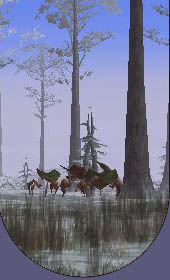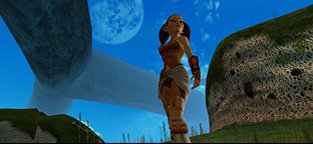
CHRONICLE The Erlan Chronicles: Forgotten Places At the request of the divine powers, homins were sent to the Old Lands to collect the resources needed to build the temples. Because of these expeditions, places that had been forgotten since the Great Swarm, such as the Dunes of Aelius, the Lake of Olkern and the Wood of Almati, were rediscovered. Each of these regions was named after a celebrated homin from the time when the civilisations were at the height of their splendour. Aelius was a famous Fyros general. He was greatly interested in the training given to young Fyros recruits; his favourite saying was "sweat saves blood". In his opinion, the training given didn't go far enough if the Fyros were to be the best warriors on Atys. Over the years an ever-increasing number of Fyros came to complete their warrior training at the Dunes of Aelius. The prowess of these volunteers proved Aelius right. His training programme was officially adopted and is still used by the Fyros Empire. The training camp was destroyed by the kitin invasion. Its remains are most likely situated under the camp installed by the Kami. Olkern was one of the Tryker people's greatest poet-adventurers. The exploits, both real and imaginary, which he put into verse were much loved in his day. Some tales, such as "Matis and King of the Bodocs" even enjoyed success among the other homin peoples, with the exception perhaps of the Matis aristocracy itself. Olkern had chosen a peaceful place to write his poems, an isolated lake, upon which he built himself a floating house. He disappeared in the Great Swarm, along with his house and many of his works. Almati was a celebrated Matis botanist. Towards the end of his life, he became the royal court's Master Botanist. His responsibilities included the sylviculture of plants destined to house the royal apartments of future generations. Almati chose a place suitable for the development of these plants. Over several years, he planted hundreds of young seedlings in an area which soon bore his name. His learning enabled him to accelerate the growth of these young trees. The beauty of these trees and the soft light dappled by the dense foliage made the wood a favourite spot for a stroll among those Matis with melancholic tendencies. Rumour had it that Almati was also an alchemist and that he indulged in reprehensible work. His close ties to the royals discouraged any attempts at investigation and provided him with ample means. Almati's detractors discreetly put it about that the old man and his devoted young assistants worked in a secret laboratory situated in mysterious caverns buried under the trees' roots. None of his enemies ever succeeded in finding the entrance. Several curious homins disappeared in the Wood of Almati in mysterious circumstances. As the rumours increased with the disappearance of melancholic subjects, the King finally resolved to ask his Master of the Palace to look into the affair and this person who had become rather troublesome. Luckily or unluckily for Almati, a few days later the Great Swarm beat down upon the Matis kingdom. Like many others, Almati disappeared in the turmoil and his caverns became a place which both alchemists and botanists longed to visit, but which was completely inaccessible. « Back |

|
|
|



